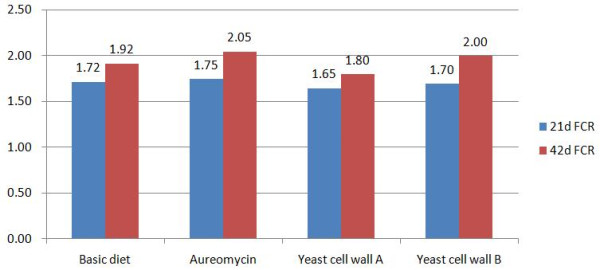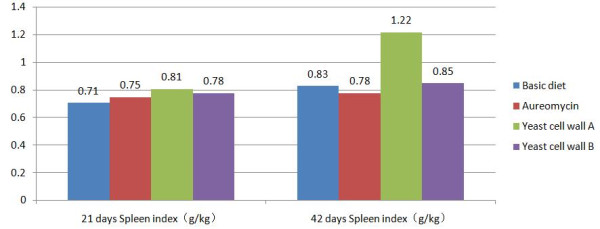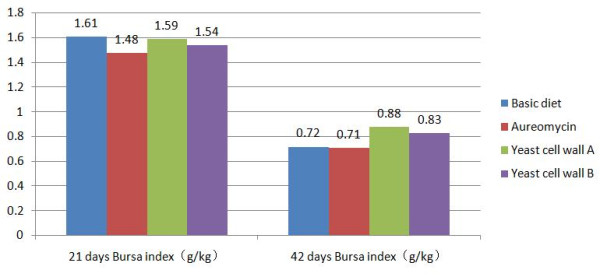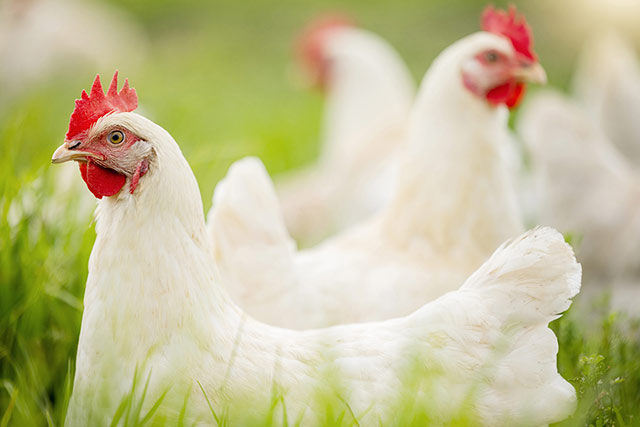October 21th, 2019
By Xiangqian Xiao
Yeast cell wall could promote the growth performance and immune organ development of broilers, and there were some differences in the effects between different kinds of yeast cell walls, which might be related to the composition of yeast cell wall.
Yeast cell wall is an important component of yeast-derived bio-feed. Its main components are mannan, glucan, protein and a small amount of chitin and lipids. At present, it has been found that yeast cell wall can absorb intestinal pathogens, promote beneficial intestinal flora, regulate immunity, and adsorb mycotoxins specifically, so it has been widely used in livestock and poultry breeding(Zhou Shengnan, 2017,Shao Mingli, 2002). Yeast cell wall is limited by technological differences in the production process, and there are obvious differences in protein, mannan and glucan components. This experiment mainly studied the application of yeast cell wall in white-feathered broilers, and provided the basis for its scientific and rational use in broilers.

Fig. 1 Effects of yeast cell wall on body weight of Broilers
(Note: "*" means significant difference, P < 0.05; "**" means significant difference, P < 0.01; the same below.)
As showing in Fig.1, there was no significant difference in body weight among 7-day-old groups (P> 0.05). The body weight of 21-day-old broilers in the group of yeast cell wall A was higher than that of other groups, but the difference was not significant (P> 0.05). The body weight of 35-day-old broilers in the group of yeast cell wallA was the highest, which was 10% higher than that of aureomycin group (P< 0.01). Compared with other treatments, the body weight of 42-day-old yeast cell wall Agroup increased significantly by 9.6%, 7.9% and 7.3% (P < 0.01).

Fig. 2 Effect of yeast cell wall on feed-to-meat ratio of Broilers
As showing in Fig. 2, there was no significant difference in feed-to-meat ratio between 1-21 days old and 1-42 days old broilers (P> 0.05), but compared with the blank control group and aureomycin group, the feed-to-meat ratio of broilers in yeast cell wall Agroup decreased by 3.5%, 5.0% (21 days old) and 3.3%, 8.0% (42 days old), respectively.


Fig. 3 Effects of yeast cell wall on immune organ index of 21-and 42-day-old broilers
Spleen and bursa of Fabricius contain abundant lymphocytes and macrophages, which are important immune organs in poultry. The index of immune organs and organs can reflect the immune function of broilers to some extent. Fig. 3 shows that the spleen index of 21-day-old broilers in each treatment group has no significant difference (P> 0.05). At 42-day-old, the spleen index of broilers in yeast cell wall group A is significantly higher than that of other groups (P< 0.01); at 21-day-old, the bursa index of broilers in each treatment group has no significant difference (P> 0.05), but the law of broilers in antibiotic group has no significant difference (P> 0.05). The relative index of bursa was lower than that of blank control group and showed immunosuppressive tendency. At 42 days old, the bursa index of broilers in group A of yeast cell wall was significantly higher than that of other groups (P< 0.05), but there was no significant difference in bursa index between other groups (P> 0.05). Generally speaking, the addition of yeast cell wall A increased the immune organ index of broilers most significantly.
Yeast cell wall has been widely used in improving animal growth performance, substitution, resistance reduction, biological protection and other fields. Wang et al. (2013) found that adding yeast cell wall polysaccharide in broiler diet could significantly increase the average daily gain of 22-42 days old and significantly reduce feed-to-meat ratio (P< 0.05); Ghosh et al. (2012) compared the application effect of yeast cell wall and bacteriocin in broilers, and found that yeast cell wall could achieve the same level of promotion. The results showed that 0.1% yeast cell wall could significantly increase the average daily feed intake (P< 0.05) and the serum T-AOC level (P < 0.05) of broilers aged 1-21 days (P< 0.05); Huang et al. (2016) added 1 kg/t yeast cell wall to the whole day of Sanhuang chickens, and added the yeast cell wall (P< 0.05). Compared with chlortetracycline, broiler chickens in yeast cell wall group showed a slight increase in hurdle weight, with an average daily gain of 1%, indicating that yeast cell wall could effectively replace chlortetracycline in Sanhuang chickens; Gong et al. (2018) evaluated the effect of yeast cell wall in replacing enramycin in yellow feather broilers, and found that yeast was finer than enramycin. The cell wall increased by 1.3% and the serum globulin and Newcastle disease antibody levels of 21-day-old broilers increased significantly.
According to the definition of yeast cell wall in the Catalogue of Feed Raw Materials, due to the difference of production technology, the content of main components (such as crude protein, mannan, glucan, etc.) may be different, and different sources of yeast milk, such as pure cultured yeast milk, waste yeast milk from beer or alcohol industry, will also be shaped. To produce yeast cell wall products of different quality. Luo (2016) studied the effects of yeast cell wall on growth performance, immunity and antioxidant function of yellow feather broilers. The results showed that two kinds of yeast cell wall (crude protein: 30.59% vs 22.92%; mannan: 16% vs 20%; dextran: 25.59% vs 29.71%) had a tendency to improve the growth performance of broilers, but there was no significant difference between them. The difference was significant (P> 0.05). The immune organ index of 21-day-old and 42-day-old yeast cell wall group increased, and the effect of yeast cell wall II was slightly better than that of yeast cell wall I. Huang Jingxi et al. (2018) evaluated the effects of two yeast cell wall products (A: crude protein (> 32%), mannose oligosaccharide (> 14%) and B: crude protein (< 35%), mannose oligosaccharide (> 20%) and dextran (> 20%~30%) on growth performance, immunity and antioxidant function of yellow feather broilers. The results showed that yeast cell wall group could significantly improve meat performance. The survival rate of chickens at 21 days of age (P< 0.05) increased the immune organ index of broilers at 21 days of age, which was basically consistent with the results of this experiment. At the same time, the serum antioxidant index of broilers at 42 days of age showed that the yeast cell wall could significantly improve the total antioxidant capacity (P< 0.05). Compared with the two kinds of yeast cell walls, the total antioxidant capacity was increased. The results showed that yeast cell wall B was better than yeast cell wall A in improving immunity and antioxidant function of broilers. To sum up, the difference of yeast cell wall products will affect animal production performance and immune function to some extent. It is speculated that the reason may be due to the difference of yeast cell wall autolysis technology and isolation level. For example, under the condition of good wall breakage and isolation level, pure cultured yeast cell wall has more. The components are in the form of functional polysaccharides such as beta-glucan and mannan, so they can exert their biological effects more effectively.
In this experiment, the growth performance of broilers in yeast cell wall group and control group and antibiotic group tended to improve, and the immune organ index of broilers increased significantly, which indicated that 1 kg/t yeast cell wall was helpful to improve growth performance and immune level of broilers. At the same time, it was speculated that the application effect of yeast cell wall with different components in broilers also existed. In a certain difference, the later stage still needs to be further studied.

About Angel Animal Nutrition:
Fubon is a brand of Angel Animal Nutrition. Fubon is committed to developing natural, efficient microbial feed derived from yeast with Angel's leading technology in yeast industry, providing the best service solutions for the nutrition and health in animals. Angel Animal Nutrition creates value for global feed and animal agriculture customers through continuously upgraded products and professional services.
About Angel:
Angel Yeast Company is a high-tech listed company specializing in yeast and biotech. Product business covers Yeast and Baking, Yeast Extract-Savoury, Nutrition & Health and Biotechnology fields. It is one of the world's leading companies in the yeast industry. Angel has 12 holding subsidiaries and provides products and services for more than 150 countries and regions.
Press contact:
ANGEL YEAST CO.,LTD
Address: 168 Chengdong Avenue, Yichang, Hubei 443003, P. R.China
Tel:+86-717-6369520, 6369558
Fax:+86-717-6370680
email: aie@angelyeast.com







